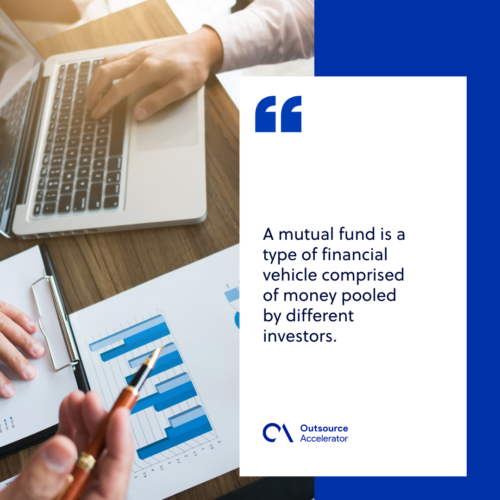Mutual fund
Definition
What is a mutual fund?
A mutual fund is a type of financial vehicle comprised of money pooled by different investors. This fund is invested in securities such as bonds, stocks, and other assets. Basically, it is a collection of assets co-owned by multiple investors and managed by a professional.
Professional money managers operate mutual funds on a daily basis. These managers are responsible for allocating the funds[1]and producing capital gains for the investors.
Mutual fund portfolios are curated to match the objectives stated in the fund’s investment prospectus.

How does a mutual fund work?
Mutual funds are simultaneously an investment and a company. That is, investors who invest in mutual funds are buying a share in the funds’ assets and partial ownership of the mutual fund company at the same time.
To illustrate, when an investor buys a share of MSFT, they purchase both partial ownership of Microsoft and its assets.
The difference is that Microsoft’s business is making computer software and applications, while a mutual fund’s business is making investments.
Mutual funds generate returns for investors in three ways:
- Dividends pay-out
- Capital gains
- Selling shares for a profit
Types of mutual funds
Mutual funds are categorized into different types, depending on the types of securities in their portfolios.
Below are some of the most common types of mutual funds:
Equity funds
Equity funds are the largest among the mutual fund types. This mutual fund subcategory invests primarily in stocks.
Equity mutual funds are further classified into more specific types, sorted according to various investment factors:
- Company market cap size (small-, mid-, large-cap)
- Investment geographic allocation (country/regional, global, international)
- Investment approach (aggressive growth, income-oriented, etc.)
Fixed income funds
Fixed income funds are a type of mutual fund invested in corporate or government bonds or other debt instruments that guarantee a set rate of return.
This type of mutual fund generates income from the interest of bonds or other debt instruments. The interest-based income is then passed to the shareholders.
Due to its particularity with bond investments, fixed income funds have also been called bond funds. Bond fund managers actively manage these funds and are always looking to buy undervalued bonds which they can sell at a profit.
Fixed income funds are more likely to provide a higher return to investors. However, bond fund investments also come with a risk.
The many types of bonds available in the market make prices vary dramatically. Moreover, almost every bond is subject to interest rate risk, meaning that the funds’ value drops as interest rates go up.
Index funds
Index funds have seen a rise in popularity in the past few years. This type of mutual fund operates on the principle that trying to “beat the market” is very hard and is often expensive.
Therefore, index fund managers purchase stocks corresponding to major market indices, such as the S&P 500 or the Nasdaq Composite. The manager’s goal here is not to outperform the index but simply “track” its movement in the market.
Because index funds are less research-intensive than other mutual funds, it also lessens expenses that decrease returns before reaching shareholders.
Balanced funds
Balanced funds spread their investments across a combination of different asset classes. Investing across multiple asset classes reduces the fund’s risk exposure.
Balanced funds are also called allocation funds and have two variations.
Some funds follow an investment strategy with a fixed and specific allocation that allows investors to have predictable risk exposure. Others utilize a more dynamic allocation strategy that depends on current market conditions or changes in the business cycle.

Mutual fund fees
Mutual funds incur several fees that eat up potential returns before being turned over to the investors. These fees are either annual operating fees or shareholder fees.
Annual fund operating fees represent a yearly percentage of the funds under management, usually 1% to 3%. Collectively, these operating fees are called the expense ratio and are the aggregate of the management or advisor fee and the administrative costs.
On the other hand, shareholder fees are paid directly by the investors when they buy or sell funds. These fees come in commissions, sales charges, or redemption fees.
Sales charges and commissions are also termed the mutual fund’s “load.” Mutual funds with front-end loads assess fees when an investor purchases shares. In contrast, back-end load fees are assessed when an investor sells off their shares.
How do investors benefit from mutual funds?
Mutual fund investments have various advantages.
Among the advantages of mutual funds investments are:
- Portfolio diversification – diversification enhances a portfolio’s returns and simultaneously reduces risks.
- Easy access to major indices – mutual funds offer investors an easy way of trading in major stock exchanges.
- Professional management – professional and experienced investment managers free investors from the burden of doing market research and executing trades.
- Transparency and accountability – industry regulations enforce fairness and ensure a fund’s accountability.
- Freedom to choose among multiple options – investors can choose among numerous managers with different investment approaches and management goals.







 Independent
Independent




